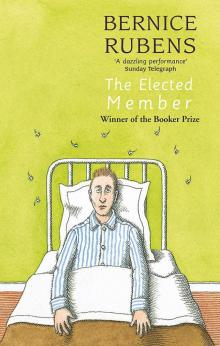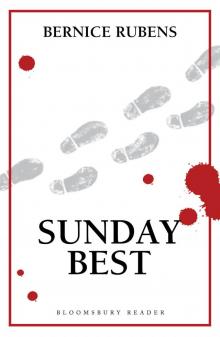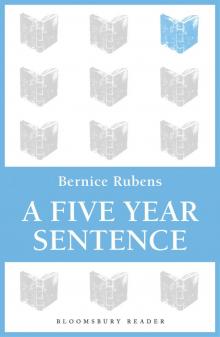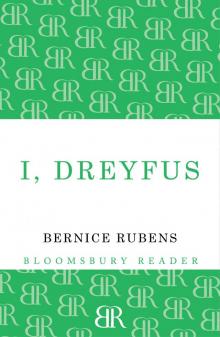- Home
- Bernice Rubens
Nine Lives Page 5
Nine Lives Read online
Page 5
I took special care with my dressing. I wanted to look my best for Donald. I was careful with my make-up. He used to love watching me as I applied the rouge and mascara. And especially when I painted my nails. I think the smell of the polish turned him on. Then my best linen suit and barely black stockings. He loved that colour. I looked in the mirror and introduced myself as the second Mrs Dorricks. It was a title I had to get used to. On the train, I tried not to rehearse what I would say to him. I tried not to imagine how he would react to the news of my visitor. I concentrated on remembering our past together, a time when Emma Dorricks was unknown to me, a time when I had no predecessor, when I was his first much-loved discovery. By the time I reached the prison gates, Emma Dorricks had been forgotten and I had to remind myself why I had changed my mind to come and visit him.
I placed myself in front of the glass partition and put my hand on my regular spot though I didn’t think that Donald would feel like playing after he’d heard about my discovery. I expected anger. Even denial. But I would weather them both, since both would be pointless. I decided that I wouldn’t spring the news on him straight away. I would wait until visiting time was nearing its end. Until then, he could tell me how innocent he was and I would do my nodding bit, and we’d still have time to play our game.
He was smiling as he entered, and immediately put his hand to match mine and together we picked up the phones. ‘You shouldn’t have come,’ he said, ‘if you weren’t feeling well. I was worried about you. You have to take care of yourself, sweetheart.’
I felt that all the wind had been taken out of my sails. My Donald was a man of few words, who had seldom given voice to his feelings. The word ‘sweetheart’ was as foreign to his mouth as it was to my ear. Even so, it had rolled so easily off his tongue, it shattered my hearing. I suddenly loved him so much for his caring. I didn’t want to think that I had shared that caring with anybody else. But most of all, I didn’t want him to think so. I would not mention the name of Emma. That name was his history. Not mine. That Emma event, like most others in his life, had been kept from me, perhaps because of his caring and for my own protection. I would not be Emma’s message carrier. In my own recording of events, she had never happened.
Donald seemed in a good mood. Happy almost, although I couldn’t imagine why. We played our fingers game for a while, and he won each time. His skill was greater than mine.
‘Have you seen the boys?’ he asked.
I noticed that his smile was fading. ‘No,’ I said. ‘They are not in touch with me.’ I wanted to share my regret with him, to assure him that I, too, was part of that same deprivation.
‘Pity,’ he said. ‘It would do me good to see them. Even though they think I don’t deserve a visit.’
I said nothing. His fingers were inert on the glass. He had lost his appetite for the game and I decided that, on my return, I would do my best to contact our boys and to persuade them to visit him.
‘Cheer up,’ I said to him. ‘How do you spend your time?’ I had never asked him such a question. I didn’t want to hint at his permanence in the place.
‘In the workshop,’ he said. ‘But I’m beginning to paint. I’m learning. A teacher comes twice a week.’
This news heartened me, as would any event that enabled him to take his mind off his incarceration.
‘Can I see one of your paintings?’ I asked.
‘Next time,’ he said. ‘I’ve not finished the one I’m working on.’
Then I began to doubt whether he had even started it, and was just trying to cheer me up. ‘I look forward to it,’ I said. I tried to start the finger game again, but he would not cooperate. It’s not a game for one, any more than tennis, and my fluttering fingers looked silly on the glass. I took my hand away, and he did the same. I was glad when the warder came and gently touched Donald’s shoulder.
‘Now, you look after yourself,’ were Donald’s last words into the phone. I assured him that I would. I also added that I loved him. He reclipped his phone and pressed his lips on the pane. And I matched his with my own. As he was leaving he turned and pursed his lips once more.
‘Emma came to see me,’ I whispered, because I knew he could not hear me. But I had promised Emma that I would try.
On the train back to London, I wondered how I could persuade my boys to visit their father. That would be the first step towards a reconciliation with Donald. Even if they considered him guilty, I would remind them of their boyhood and of the gentle role that Donald had played during those years. They could visit him just for that, for having been a good and caring father. Whatever they now thought, they had a duty to acknowledge those years. I felt myself growing angry and resenting them. Hating them even. It simply wasn’t fair that I had to bear the burden of his innocence alone.
The Diary
Four Down. Five to Go.
I had to laugh when I read the police psychologist’s report. It was in all the papers. Though it didn’t surprise me – I would not have expected any trace of imagination from that quarter. The poor sod reckons I am an unfrocked shrink. As if anybody in their right mind would have opted for such a profession in the first place. And I mean, precisely, in their right mind. For a truly right mind has no need to foist its own hang-ups on others in the name of healing. Old Arbuthnot also pointed out that the irregular intervals between the murders might be a significant factor. Well, I have foxed him and my most recent attack was nine months after my last. Let’s see what Arbuthnot makes of that one. He’ll probably deduce some gestation theory and phrase it in psychobabble. He has at least saved us from his theories regarding the guitar string. He’ll never get to the bottom of that one, I promise you. So witter on, Dr Arbuthnot, and may you choke on your own gobbledegook.
I began to feel a little sorry for old Wilkins and his footsore slog around the country in pursuit. So out of the kindness of my heart, I decided to stick to London for my next sortie, so that both he and I wouldn’t have too far to go.
I had to attend the school sports day. My boys were in the races and I had promised them to enter for the hundred yards fathers’ sprint. I was glad of the diversion. I welcomed any physical exercise. I needed to keep fit for my mission. Martin won the long jump and Matthew broke all records with his discus throw. Verry was delighted, and I was proud of them both. And nervous too, because my own event was coming up. I wanted them to be as proud of me. I lined up among the other fathers. The competition would be keen, for all of them looked very fit. There were about ten of us and I was determined to be first. I wouldn’t be satisfied with any other placing. It was this determination, I think, that injected my heels and I ran like a hare to the finishing post, leaving them all behind. I heard Verry and the boys’ cheers above all the others. I had won, not for myself, but for them. I saw my victory as a good omen for my next strike. That night, Verry cooked us a special supper, but my exertions had tired me and I went early to bed.
I had made an evening appointment with one Alistair Morris. My first night attack. I was excited. I had checked on Morris and found out that he was a bachelor who lived alone in north London. Not too far away, either for myself or for Wilkins. I discovered, too, that Morris was a Jungian therapist. I was not too sure what that meant but I was curious as to his methods.
Once again, I dressed as a woman, though this time in a skirted suit and high heels. I varied the wig too. I fancied myself as a blonde. I had made the appointment in the name of Priscilla Downes. I liked the ring of it, and I practised the name as I drove towards my quarry. As was my wont, I parked my car a little distance from my target’s home. There were few people around. But I wasn’t worried; I was in drag and, in any case, it was already dark. But I made sure that Morris’s street was empty before I rang his bell, and that no net curtains had been raised. I hesitated before ringing. I was feeling too cocky, too sure of myself. I was still relishing the aftertaste of my fathers-race victory. Yet I couldn’t hesitate too long. I primped my wig, and rang his bell. When asked
, I announced myself through the intercom.
‘Miss Dowries.’ I offered my contralto, the highest I could risk and I waltzed inside. I noticed a suitcase in the hall, suggesting arrival or departure. But, either way, it wasn’t going anywhere. My womanly gait gave me confidence, which was boosted by the sight of my target. He was of slight build, thin, bony almost, and considerably shorter than I. What pleased me most was his neck: scraggy and of small diameter. He could be quickly and cleanly dispatched.
‘Miss Downes,’ he stated. ‘Please sit down.’ And almost in the same breath, ‘Of course, you are not Miss Downes. Mr Downes rather.’
All my self-assurance evaporated. This was the second time I’d been rumbled, and I could happily have killed the man there and then.
‘Well, that’s what I’ve come about.’ I relaxed into my baritone voice and recited my rehearsed lines.
‘Shall we try a little something?’ he said.
He was not asking my permission, for he didn’t wait for an answer. ‘I’m going to give you a word, and I want you to say, without thinking about it – that’s important – I want you to give me a word that comes into your mind. Shall we try it?’
Again it was not a request for permission. This must be the Jungian method, I thought. Free association, I think they call it. I decided to let him play with me for a while.
‘Are you ready?’ he asked.
I nodded.
‘Mother,’ he said.
‘Father,’ I hit back at him.
‘Dark?’
‘Moon’ was my response.
‘Dream?’
‘Wake.’
‘Business?’
‘Money.’
Thus we ping-ponged with as yet no point scored.
‘Sport?’ he tried again.
‘Skipping.’
Then he served an ace that I couldn’t return.
‘Rope,’ he yelled.
I felt assaulted, invaded, and I was certainly not going to play any more. How dare he throw me a word that not even I could pronounce, one that I could barely imagine. He had sailed too close to the wind. He had chanced his arm and although he was not aware of it, he was nudging my crusade off course. He had to be shoved out of the way.
I got up quickly.
‘I’m going to kill you,’ I said. ‘I have to. I’m on a mission.’
And it was that word, that mention of my inflexible crusade, it was that word that spelt out my cause as just. I moved towards the desk. I took out my string and dangled it in front of him. Then he realised what I was about and he rose, trembling with fear and rage. He threw himself on me and tried to pin me to the ground. But I was stronger and I threw him off. His resistance excited me, and knowing my superior strength I was content to spar a little. Then he kicked me in the groin and took the wind out of me. My anger was greater than my pain, and I shoved him back into his seat, laced his scraggy neck, and did the business. I avoided the blood as I tested his pulse. I was wearing one of Verry’s favourite suits and I didn’t want it stained.
I left the house quickly. There were some people about, but by now it was very dark and I doubt if any of them saw me leaving. However, to be on the safe side, I did not return to my car. I decided I would walk towards the Underground station, and then lose myself in its passages. In any case, I needed to walk. I needed to clear my head. Usually after a killing, I felt elated and I would sing on my way home. But this time there was no feeling of triumph. On the contrary, I felt deeply depressed. It was Mr Morris’s resistance that had unnerved me. He had no right to put up a struggle. He had met his just end. To date, I had killed four people. In the terms of my mission, they were guilty, each one of them, and each one of them deserved to die. I must not question that assumption. Never. Else my crusade would be denied its purpose. Yet, after Morris, for the first time since I had set out on my mission, I itched with scruple.
I could not afford misgivings. I could not suffer qualms. I walked slowly back to my car. I went over in my mind all the reasons why my mission was imperative, and why I had started on it in the first place. The whole ‘why’ of it. So I analysed it, imaged it, picture after compelling picture, and by the time I reached my car I felt appeased and I hummed my way home.
FOUR DOWN. FIVE TO GO.
When Wilkins was informed …
When Wilkins was informed of the Morris murder, he was delighted. This time, he was positive the killer had slipped up. He must have. He was optimistic, even though the odds were stacked against him. For it was a good three weeks before Mr Morris’s body was discovered. Information from a neighbour revealed that Mr Morris had booked a three-week holiday in Ibiza and the local newsagent confirmed that his paper delivery had been stopped. Other neighbours, when questioned, agreed that Mr Morris was a ‘queer bloke’, a phrase used by many of them, some with a curled lip and others with a sly smile. Such information did not hearten Wilkins, for it pointed to a very specific motive for the killing. A rejected lover, perhaps. He had known of similar cases. The killer could well have been some other than the man he was after. Nevertheless, he lived in hope of a clue.
It was a suspicious postman who had alerted the police. He had noticed that much post had accumulated and the box was full. He had opened the flap to push the letters through, and had reeled from the abominable smell. He’d invited a neighbour to share the aroma, and both suspected its source.
‘It was bound to happen one day,’ the neighbour said, and the postman didn’t know what she was talking about.
Wilkins almost sprinted to the north London suburb, photographer and police pathologist panting at his heels. By the time they arrived, the neighbours had gathered outside on Mr Morris’s neat front lawn. Wilkins ordered them back to their houses and saw to it as his aide gently prised open the front door and staggered backwards, choked by the smell. The investigators muffled their mouths with scarves or handkerchiefs and entered.
They did not have to look for the body. The smell led them to the spot. Enough was left of poor Mr Morris to reveal the method of his murder – a neat guitar string around the neck; and, after meticulous examination, not a single print of any kind in sight, nor any sign of a break-in. It could have been a copy-cat killing, Wilkins thought. It could well have been a rejected lover, one who had been invited inside, or perhaps even used his own key, who had wreaked his vengeance. The pathologist knelt over the body. He could not be precise as to the day and time of the killing. The rate of decomposition indicated that Morris had been dead for at least three to four weeks. At that stage he could not be more specific. The muffled photographer went about his business, and to an audience of muttering net curtains what was left of poor Mr Morris’s body was parcelled away in an unmarked van. Wilkins returned to his desk and, although he knew it was wicked, prayed for another killing.
No address book had been found at Mr Morris’s house. And no diary. Just a filing cabinet containing details of his patients. Wilkins underwent the dreary task of interviewing them all. Except one, a Mr Johnson, who was never at home. But Wilkins attached little importance to his absence. Throughout his long investigations he had found that patients in general had little to offer by way of clues and their attitude to each killing varied between delight and sorrow. Mr Johnson might well be on holiday, and perhaps unaware of his counsellor’s demise. As he sat at his desk, mulling over the evidence, or sheer lack of it, that he had collected during the course of his therapist inquiries, he was called by the front office. A Mr Jeremy Johnson wanted to see him on a matter of urgency. The name rang like wedding bells in Wilkins’ ear.
‘Has he stated his business?’ Wilkins asked, though he knew the answer.
‘The shrinks,’ the messenger said.
Wilkins composed himself. He envisioned a confession. He felt it in his bones. But he must beware of a hoax. There were enough nutters around who, for reasons unknown, confessed to murder. But he did not think Johnson was one of them. He would be gentle with him. Very gentle. Until he wa
s convinced by his confession. Then he would spit on him.
He told the messenger to bring the man to his office. He arranged a chair in front of his desk so that he could look him squarely in the face. Gentle, gentle, until he was taken to the interrogation room. Then perhaps he would be offered a cup of tea.
He stood up as his door opened. ‘Come in, Mr Johnson,’ he said. ‘Sit down.’
He settled himself behind the desk and looked directly at his visitor. And what he saw did not please him. The man was wearing make-up, unashamed mascara on his eyes and rouge on his cheeks. He might well have been a rejected lover, who had killed for that reason, but no way could he be a serial killer. The man was perfumed too, and the smell wafted teasingly across the desk.
‘What can I do for you?’ Wilkins asked.
Mr Johnson came straight to the point. ‘I’ve come to confess,’ he said. He put his hands together in a cathedral shape, his long fingers trembling, and Wilkins noticed that his lacquered nails were slightly chipped.
‘Confess to what?’ he asked.
‘I murdered Mr Morris,’ he said.
‘Would you say that again?’ Wilkins asked, playing for time. He could not yet make up his mind whether the man was a hoaxer.
‘Like I said,’ Mr Johnson insisted, ‘I murdered Mr Morris.’
‘How did you murder him?’ asked Wilkins. The ‘whys’ could come later.
‘I garrotted him. With a guitar string.’
‘Did you wear gloves?’ Wilkins asked.
‘Of course. I didn’t want to leave fingerprints.’
‘Did you get blood on your clothes?’
‘No. I took care of that. I stood well away.’
‘And how did you get into the house?’
‘Mr Morris let me in. As he did, every Tuesday, Wednesday and Thursday at six o’clock. I was always his last patient of the day.’
‘Patient?’ Wilkins was slightly thrown.

 The Elected Member
The Elected Member Sunday Best
Sunday Best Nine Lives
Nine Lives Madame Sousatzka
Madame Sousatzka A Five Year Sentence
A Five Year Sentence I, Dreyfus
I, Dreyfus